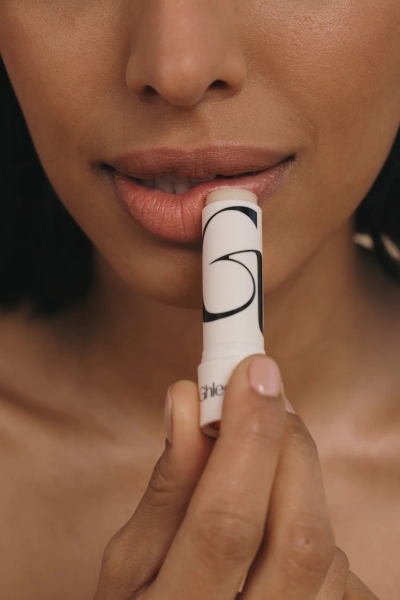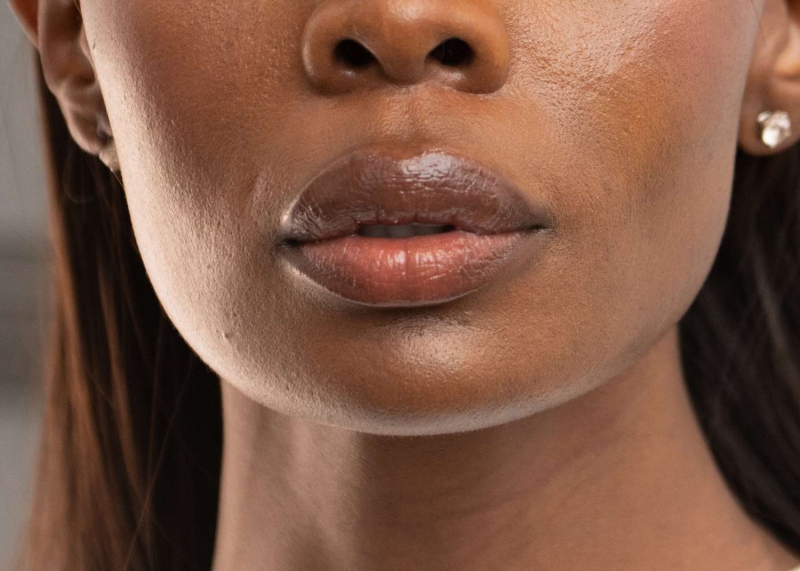Contents
When we think of hyperpigmentation concerns, we normally think of it affecting the skin on the face only. However, experiencing hyperpigmentation, which is the overproduction of melanin causing dark patches on lips specifically, is actually a very common issue. Despite the fact that lips have extremely thin skin and do not contain a large amount of melanin, lip hyperpigmentation can be due to many factors. These include mainly environmental aggressors, such as UV light or hormonal issues; however, in some cases, skin-care routines and practices (like dryness and picking) or more serious underlying health concerns could be to blame.
The good news is that at-home treatments can help with lip hyperpigmentation, and there are easy steps and products you can use to help prevent it from happening in the future. For more serious cases, seeing a skin pro to access in-office treatments to help reverse excess melanin in the lip area may be required, and these typically showcase effective results.
Meet the expert
- Ariel Ostad, MD, is a dermatologist and cosmetic surgeon in New York City with his namesake private practice.
Deanne Mraz-Robinson, MD, is co-founder of Modern Dermatology in Westport, Connecticut and assistant professor of dermatology at Yale School of Medicine.
Joshua Zeichner, MD, is an associate professor of dermatology and director of cosmetic and clinical research in dermatology at Mount Sinai Hospital in New York City.
Read on to understand what hyperpigmentation on lips is, why it happens, how to treat it, and how to prevent it from happening from the start.
Signs of Hyperpigmented Lips
First, it’s important to explain exactly what hyperpigmentation is wherever it may be found on the skin. Hyperpigmentation is an accumulation of excess melanocytes, the melanin-producing cells responsible for creating pigment in the skin. “The surge of melanin that results in hyperpigmentation develops for a variety of reasons ranging from ultraviolet light exposure to hormonal fluctuations to the result of inflammation in the skin such as cuts, scratches, pimples or even low-grade trauma from chronic rubbing or scratching,” says Dr. Zeichner. “Even aggressive removal of makeup using towelettes can lead to low-grade inflammation and hyperpigmentation over time.”
As for lip hyperpigmentation specifically, look for signs of darkening that are all over, in a certain area on the lips themselves, or even slightly above or below them, that cause the natural color of lips to be affected. Dr. Mraz-Robinson explains that “hyperpigmentation on lips can present itself as dark spots or as a more spread out patch on the skin above the upper lip which is melasma or sometimes referred to as a melasma mustache,” she explains. “This type of darkening will appear above the upper lip, while most lip hyperpigmentation is found on the ridge of the bottom lip because this area tends to catch the most UV exposure.”
What Causes Lip Hyperpigmentation?

There are a broad range of reasons you may be experiencing lip hyperpigmentation. It could be as simple as how you treat your lips physically day to day. “When it comes to becoming more susceptible to having hyperpigmentation on lips, chapped lips, lip licking, lip biting or even picking at dry skin on lips can cause inflammation that heals with dark blotches,” notes Dr. Zeichner. It also may be due to acute lip issues and how you handle the healing process. “Cold sores are common around the lips and mouth, and these lesions can heal with hyperpigmentation, especially if severe,” Dr. Zeichner adds.
Mraz-Robinson explains that although hyperpigmentation is most often triggered by UV exposure, even for those who are devoted to sunscreen use, the lip area is often overlooked or not reapplied as often as required to stave off damage. Hormonal imbalances due to oral contraceptives or lifestyle changes (from pregnancy to post-pregnancy) can also cause an imbalance of melanin production known as melasma. “Melasma-related hyperpigmentation is more common in women, specifically those who are pregnant or on hormonal birth control,” Dr.Mraz-Robinson says.
How to Prevent Hyperpigmented Lips
“Prevention is key when it comes to dealing with hyperpigmentation, including when it’s on lips,” says Dr. Zeichner. The most important method of prevention, regardless of the cause of your lip hyperpigmentation, is sunscreen. “Make sure to apply—and reapply—lip products with at least SPF 30 every day,” he says. That’s because SPF provides the delicate skin of the lips (and all skin for that matter) with protection from ultraviolet rays, a main cause of pigment issues. Be sure to reapply it throughout the day because any form of treatment on the lips tends to not remain on for a long because of movement, drinking, and eating. Continuous use of nourishing lip treatments (this can be in balm, stick, or serum form) is also critical to help prevent lip hyperpigmentation as well as maintain soft, healthy lips in general by bolstering the skin’s barrier to ward off damage. Treat lips not only during the day but also at night when penetration of key hydrators can surge. “Overnight lip masks can help hydrate, soothe, and protect lips to keep the skin barrier in good shape,” Dr. Zeichner says.
SPF Lip Balms
In addition to SPF products, Dr. Mraz-Robinson suggests wearing a wide-brimmed hat to help minimize and physically shield excessive UV exposure if pigment concerns for skin and lips are a concern. She also notes that breaking bad skin habits that could be to blame can have a huge impact. “Lowering inflammation and the skin’s inflammatory response by not lip licking or biting can prevent lip hyperpigmentation,” she says.
How to Treat Hyperpigmented Lips
If you’re already experiencing lip hyperpigmentation, you need to curate a customized treatment plan at home or in the office to help minimize the elevated levels of melanin in this area. Ostad explains that basic skincare swaps can be extremely beneficial, especially because the skin on the lips is extremely delicate. “Moisturizing is essential to keep the skin barrier on lips intact to avoid allergens or irritants from getting in,” he explains.
Hydrating Lip Balms
Mraz-Robinson also notes that it’s important to hydrate, condition, and nourish the lips. “Hyperpigmentation will tend to look worse when the skin is dehydrated,” she explains. She also recommends reaching for products that contain ingredients proven to help break up the build-up of melanin. “Use a lip product that contains vitamin C, which can brighten and reduce dark spots,” says. “In addition, mandelic acid is another active to seek out as it has been shown to improve hyperpigmentation, including melasma, with consistent use.”
Exfoliating Lip Treatments
Dr. Ostad suggests also trying lightening agents that are typically laced into standard skincare products for your face. “Depending on the cause of your lip pigmentation, it may be treated with lightening agents like hydroquinone, arbutin, which is a plant-based lightening agent, retinoids, or corticosteroid creams,” he says. Experts also say that if at-home treatments are not working, then you may need to visit a skin professional to ask about in-office options. Laser treatments, in particular, can help some cases of lip hyperpigmentation that don’t heal with topicals. “That’s because specific lasers intended for treating pigment concerns emit a beam of light that destroys a specific target in the skin, in this case, excess melanin,” says Dr. Zeichner.
Frequently Asked Questions
- Does hyperpigmentation on lips go away?
“Hyperpigmentation does not generally go away on its own,” says Dr. Ostad. Remember, if you don’t have any concerns about the cause of your lip hyperpigmentation, it's recommended that you try at-home treatments to resolve the issue and prevent it from happening again. However, if the lesions are painful, crusting, or not healing, you should see a dermatologist to reveal the cause and treat it with in-office options such as laser treatments to break up the excess melanin production.
Are certain skin types more susceptible to hyperpigmentation on lips?
“Darker skin tones are more likely to develop issues with hyperpigmentation in general since there is more baseline melanin and melanocyte activity,” says Zeichner. “However, the lower lip area in particular is more at risk for hyperpigmentation for all skin since it faces upwards towards the sun.”
Can lip hyperpigmentation be a sign of a more serious skin issue?
Although rare, in some cases, hyperpigmentation in lips could be a sign of something more concerning, explains Dr. Mraz-Robinson. “If the dark spots are raised, itchy, dry, or cracked, it may be a type of skin cancer or precancer such as actinic keratosis or solar cheilitis and should be checked immediately,” Dr. Mraz-Robinson says. “In addition, sometimes dark spots on the lips can signal something going on medically like a genetic disorder or nutrient deficiency.” Also not common but possible: “Allergic reactions can lead to darkening on the lips,” notes Dr. Ostad.
